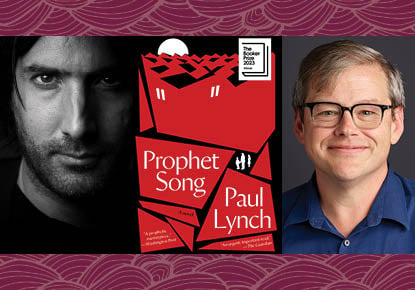Closing the Book on Summer
Hello!
I have a very special appearance coming up soon that I wanted you to know about. On Wednesday, October 9th at 7 pm, I’ll be interviewing Irish novelist Paul Lynch, author of the 2023 Booker Prizewinning dystopian novel, Prophet Song, at the downtown branch of the Seattle Public Library. It’s free, and it should be a fantastic conversation.
Prophet Song takes place in an Ireland that’s lurching to the far right. A mother tries to hold her family together as secret police keep the population in fear and a guerilla war unfolds in slow-motion. It has a lot to say about the global rise of fascism, of course, and also migrant crises and whether everyone is complicit when a whole society turns sour.
It might be a lot to ask people to think about dystopia in the year 2024 less than one month before a presidential election, but I have reason to believe that this will be a hopeful conversation. Unlike say, The Road, Prophet Song is too unapologetically human to be a hopeless book. In any case, Lynch is an uncommonly talented, brilliant writer, and it’s always hopeful to hear from someone who can craft heartbreakingly beautiful prose.
I hope you’ll join us. Here’s a graphic that someone at SPL made for the event, in which Paul Lynch looks like a rock star and I, uh, do not:

I’ve Been Writing
I wrote a little preview of the Bainbridge Book Festival, the first-annual literary festival in Winslow, just steps from the ferry terminal. It takes place this Saturday, October 4th, and it’s absolutely free. (There’s a fundraising event with Nicola Yoon on the 3rd that looks great, too.)
I interviewed two sisters who are taking over one of the smallest bookstores in town, Madison Books. The bookstore was founded by Seattle bookselling legend James Crossley, who moved away to found a bookstore in St. Louis last year. Crossley’s fingerprints (and heart and soul) were on nearly every book in Madison Books, so I was skeptical that anyone could take such a personality-driven bookstore and turn it into something new. But having talked with Sarah Trainer and Christina Leber, I have no doubt that the store is in good hands as a sister act.
And I previewed 11 of the most interesting new-in-paperback September releases for the Seattle Times, and also I wrote about the 2023 Washington State Book Awards shortlist and winners. It was super-fun to see that so many of the WSBA shortlisters this year were people who had written for or otherwise participated in the Seattle Review of Books back in the day; I was proud to see folks like Robert Lashley and E.J. Koh get the attention they deserve. I’m sure this isn’t the last time they appear on an awards shortlist, and I’m certain they both have awards in their future.
I’ve Been Reading
Because I read and enjoyed Charlie Huston’s novel Catchpenny a few months back, a social media pal sent me a spare copy of Huston’s earlier novel Caught Stealing. I really enjoyed this one, which tosses an on-the-skids baseball fan into a dark criminal underworld where everyone is out to get him. Unlike Catchpenny, which blends crime and urban fantasy, this is a straight-up crime thriller that would appeal to fans of Elmore Leonard—but be aware that it’s way more violent than a typical Leonard book.
I’ve enjoyed pretty much every novel Stephen King has published lately, but I found his new short story collection, You Like It Darker, to be a bit of a mixed bag. I actually got into King through his short story collection Skeleton Crew, so I was surprised to find that about half these stories bounced off me. But I am so glad that I read this if just for the last story, which is a story about a supernatural being called the Answer Man that a young King started decades ago and then dumped in a drawer, only to be completed by the older King recently. That collaboration by one man across decades is especially fitting for a story about aging and examining a life in full, and it’s absolutely beautiful.
The premise of Natalie Sue’s novel I Hope This Finds You Well is a good one: The company miscreant accidentally gets access to her entire office’s emails and chats, giving her godlike omniscience over her workplace’s gossip. But that idea doesn’t really get developed—instead it just sets the stage for a fairly obvious romance plot. I enjoyed the voice and character details quite a bit, but I wish Sue had kept the energy of the first hundred pages going a little longer.
Dash Shaw makes a lot of huge comics, but I think Blurry might just be my favorite of his. It’s a big thick chunk of a graphic novel, and its structure is basically people telling anecdotes to each other. Every time the main character of a section starts to listen to another character tell a story about themselves, that new character takes over the focus of the book. The way it all unfolds is clever, and Shaw manages to tie everything together in a satisfying, and not heavy-handed, way.
Simon Rich is a very funny writer: He started writing for SNL at a very young age and now he’s a New Yorker regular. I’ll read pretty much everything he writes. But I especially recommend listening to the audiobook version of his latest short story collection, Glory Days, because the book is read by Rich’s longtime friend, John Mulaney. Mulaney clearly hasn’t read many audiobooks, and so he brings a tentativeness to the book that makes it feel even more interesting. I especially liked the story narrated by a middle-aged Mario who is called upon to rescue the Princess one more time, even though his back is failing him. This one is great for road trips.
M.E. Thomas’s Confessions of a Sociopath is exactly what the title says: A diagnosed sociopath tries to explain how she views the world. I started and failed to finish several memoirs this month—people are getting a little too comfortable revealing their worst selves to the world—but I finished this one. It was interesting, though not revelatory.
Nicholson Baker was an early favorite of mine, though I’ve been less interested in his late-career nonfiction. Finding a Likeness is a book documenting Baker’s progress in learning how to draw and paint through the pandemic. It’s heavily illustrated, with multiple artworks per page, and I thought it was an interesting, if slight reading experience. I do think the book designer should be harassed out of the industry for the good of humanity. Who decides to publish a book in white text on a dark gray background? And who in their right mind then prints the whole thing on super-glossy paper so any light directly on the page obscures the text? Straight to book-designer jail for you.
John Ganz’s new book When the Clock Broke was probably my favorite reading experience of the month. Ganz tries to make the case that you can find all the foundations of our current hyperpartisan political mess in the politics of the early 1990s. The book walks us through the careers of some of the biggest political figures of the time, starting with David Duke and continuing through Pat Buchanan, Ross Perot, and Bill Clinton. There were lots of new perspectives that I hadn’t considered and I also enjoyed the nostalgia of remembering the political scene that was active when I was first becoming aware of American politics.
Summer, Again

I’ve mentioned in this newsletter before that every summer when I go on vacation to the Washington coast, I reread Finnish cartoonist Tove Jansson’s novel-in-short-stories The Summer Book. This year was no exception. I think it’s the fourth or fifth time I’ve read it, but it could be the sixth.
I’m not the kind of person who rereads books that often. There are too many interesting books that I haven’t read for me to spend a lot of time on reruns. But I do think there’s some value in revisiting books now and again. Just as you can never step in the same river twice, you’re never the same person when you reread a book. Your experience is going to be different every time.
And revisiting the same book on multiple occasions creates a weird time-warp sensation. When I reread the Summer Book now, I feel a certain closeness to myself at other times in my life. Once I read it sitting on a log on a hot, sunny day at the beach. Another time, I spent a cool and dewy morning with it on a porch with a full French press of coffee. This time I sat in an easy chair late at night and read it as I felt weariness settle over me like a comforter. The veil between those moments of reading feels especially thin—like I’m in conversation with the book, and with myself through time.
The Summer Book is a book about summer, and grief. A young girl named Sophia and her grandmother spend the summer at a house on a small island off the coast of Finland. It’s mentioned, in passing, that Sophia’s mother has died, but they don’t really talk about that. Instead, they just spend time together. They get on each others’ nerves and talk each other into having adventures and make each other laugh a lot. The vignettes are short, but the emotion running underneath each of them can be explored by submarine.
Every time I read the book, different stories stand out. Sometimes I connect more emotionally with Sophia. Other times, I identify with the grandmother. Once, the writing about the weather and geography of the island moved me more than the characters. This time, one story hit me hardest: The little girl adopts a cat named Moppy that absolutely hates her. This passage nearly killed me:
“It’s funny about love,” Sophia said. “The more you love someone, the less he likes you back.”
“That’s very true,” Grandmother observed. “And so what do you do?”
“You go on loving,” said Sophia threateningly. “You love harder and harder.”
Her grandmother sighed and said nothing.
That “threateningly” had me howling this time. I can’t recall ever catching on that passage in the past, though I’ve always loved this particular story. And I can’t wait to see what stands out next year, and who the person reading the book will be.
Take care,
Paul